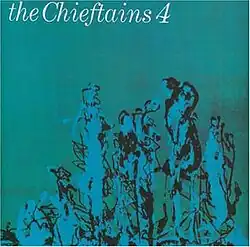The Chieftains 4
| The Chieftains 4 | ||||
|---|---|---|---|---|
 | ||||
| Studio album by | ||||
| Released | 1973 | |||
| Recorded | September 1972 – February 1973 | |||
| Studio | Morgan, London, UK | |||
| Genre | Irish folk music | |||
| Length | 40:08 | |||
| Label | Claddagh | |||
| Producer | Paddy Moloney | |||
| The Chieftains chronology | ||||
| ||||
| Review scores | |
|---|---|
| Source | Rating |
| Allmusic | |
The Chieftains 4 is an album by The Chieftains. It is the first album to feature Derek Bell on the harp. This album is where The Chieftains' modern sound began.[2]
Track listing
All tracks traditional compositions; except where indicated
- "Drowsy Maggie" – 4:00
- "Morgan Magan" – 2:53
- "The Tip of the Whistle" – 2:57
- "Bucks of Oranmore" – 2:17
- "The Battle of Aughrim" – 7:36
- "The Morning Dew" (Paddy Moloney) – 3:34
- "Carrickfergus (or Do Bhi Bean Uasal)" – 2:49
- "Sláinte Bhreagh Hiulit (Hewlett)" – 2:34
- "Cherish The Ladies" – 2:29
- "Lord Mayo" – 2:44
- "Mná na hÉireann (Women of Ireland)" (Seán Ó Riada) – 3:33
- "O'Keefe's Slide /An Suisin Ban (The white blanket) / The Star Above The Garter / The Weaver's Slide" – 3:39
Personnel
- The Chieftains
- Paddy Moloney - uilleann pipes, tin whistle, arrangements, musical director
- Martin Fay - fiddle, bones
- Seán Potts - tin whistle
- Seán Keane - fiddle
- Peadar Mercier - bodhran, bones
- Derek Bell - harp
- Michael Tubridy - flute, concertina, tin whistle
- Technical
- Paul Tregurtha - recording
- Edward Delaney - cover painting
Legacy
The arrival of Derek Bell on harp gave The Chieftains a distinctive delicate sound. The slow air "Mná na hÉireann" (Women of Ireland), composed by Seán Ó Riada, was used in Stanley Kubrick's 1975 film Barry Lyndon. In 1996 Mike Oldfield recorded it on his album Voyager but credited it to "Traditional".
References
- ^ Allmusic review
- ^ Glatt, John (1997). The Chieftains: the Authorized Biography. New York: Da Capo. ISBN 978-0-306-80922-4.